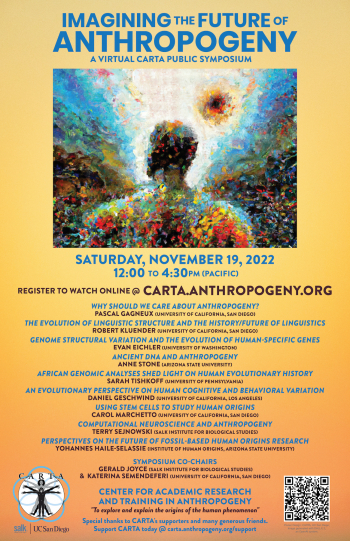Imagining the Future of Anthropogeny
Gerald Joyce, Salk Institute for Biological Studies
Katerina Semendeferi, UC San Diego
Summary:
Anthropogeny, the study of human origins, is an extremely dynamic research field. The last decade has provided many new discoveries, ranging from new fossil finds, ancient DNA data, including from extinct hominins, comparative psychology in captivity and in the wild, molecular and cell biology, neuroscience, and linguistics. New methods in most of these fields and multi-disciplinary collaborations between them are providing exciting new insights into the complicated evolutionary journey that gave rise to our species.
Despite this, we remain far from understanding some of the most striking human-specific characteristics: the reasons for our bipedality, the factors selecting for our dexterity at creating and using tools, the true age of fire use in our distant ancestors, the mechanisms, both social and biological, leading to our symbolic capacities, personal names, language, and shared imaginations.
This symposium will feature CARTA advisory committee members and provide them the opportunity to share their visions for the future of anthropogeny. They will each highlight where they hope future efforts should be focused and what type of novel collaborations are most promising for improving our understanding of the human phenomenon.
Media for each talk can be played by clicking on icons in the table below, or by clicking on the individual talk titles below and then the attachment file at the bottom of the page.
| Speakers | Media | Session |
|---|---|---|
 Katerina Semendeferi |
|
Welcome & Opening Remarks |
 Pascal Gagneux |
|
Why Should We Care About Anthropogeny? Our species is between 300,000 and 200,000 years old. For most of this one-quarter of a million years, up until just 12,000 years ago, it appears that our ancestors lived in small populations, in small-scale societies of which we can only guess the real nature. It is truly humbling how we remain in the dark about the age of some of the most diagnostic features of our species: our striding bipedalism, complex tool manufacture and use, fire use, language and societies defining their own... read more |
 Robert Kluender |
|
The Evolution of Linguistic Structure and the History/Future of Linguistics For the past 30 years, the frontiers of language science have been in the areas of neurolinguistics and genetics, both of which arose in conjunction with new technologies emerging in the 1990s. It is probably safe to say that these trends will continue apace as technology in these areas continues to advance, allowing for increasingly sophisticated and fine-grained analysis. In this talk, I first look backwards in time, in a review of the provenance and history of linguistics as a field. The... read more |
 Evan Eichler |
|
Genome Structural Variation and the Evolution of Human-Specific Genes The discovery and resolution of genetic variation is critical to understanding disease and evolution. I will present our most recent work sequencing diverse human and nonhuman primate genomes using both ultra-long and high-fidelity long-read sequencing technologies. Advances in this area have made possible the first telomere-to-telomere assemblies of the human genome and much more complete chimp, gorilla and orangutan genomes providing new biological insights into regions typically excluded... read more |
 Anne Stone |
|
Ancient DNA and Anthropogeny The first Neandertal DNA was recovered 25 years ago, and since then, ancient DNA has provided many surprising insights into human evolutionary history. Among these are the discoveries of the multiple admixture events among late Pleistocene humans and the remnants of archaic DNA in our own genomes. How does ancient DNA research contribute to the future of anthropogeny? In this talk, I will reflect on the findings of last quarter century of ancient DNA research about archaic humans and their... read more |
 Sarah Tishkoff |
|
African Genomic Analyses Shed Light on Human Evolutionary History Africa is thought to be the ancestral homeland of all modern human populations within the past 300,000 years. It is also a region of tremendous cultural, linguistic, climatic, and genetic diversity. Despite the important role that African populations have played in human history, they remain one of the most underrepresented groups in human genomics studies. A comprehensive knowledge of patterns of variation in African genomes is critical for a deeper understanding of human genomic diversity,... read more |
 Daniel Geschwind |
|
An Evolutionary Perspective on Human Cognitive and Behavioral Variation Human cognition and behavior are highly heritable and so is liability to disorders that affect them. This includes neuropsychiatric disorders such as schizophrenia and autism spectrum disorder (ASD). We have been interested in understanding the genetic basis of susceptibility to ASD, as well as the more general relationship of genetic factors that influence human brain function to features of primate and human brain evolution. Since most disease associated variation impacts non-coding regions... read more |
 Carol Marchetto |
|
Using Stem Cells to Study Human Origins Since the split of Homo sapiens from the last common nonhuman primate (NHP) ancestor, the human brain has substantially altered its size, structure and connectivity. The human brain has a larger mass with respect to body weight, increased cortical neurons with respect to size, an expanded proliferative zone, and unique connectivity patterns. Human-specific neurodevelopment is not only marked by physical differences, but also by temporal changes. Human neurons, during both prenatal... read more |
 Terry Sejnowski |
|
Computational Neuroscience and Anthropogeny Neuroscience has made great strides in the last decade following the Brain Research Through Advancing Innovative Neurotechnologies (BRAIN) Initiative, a science and engineering grand challenge that has greatly accelerated research on large-scale recordings from neurons and reconstructions of neural circuits. Large-scale neural network models have in turn inspired major advances in artificial intelligence. These network models have been trained on large-scale data sets to recognize objects in... read more |
 Yohannes Haile-Selassie |
|
Perspectives on the Future of Fossil-Based Human Origins Research Current knowledge of our deep past is primarily derived from ancient fossils of our ancestors that paleoanthropologists search for and discover in some of the most remote areas of the world. In the last two decades, significant fossil discoveries have been made and these discoveries have re-written some parts of our deep past. With these discoveries also came significant improvements in analytical methods and technological advances that helped us extract more information from the fossils we... read more |
 All Speakers  Gerald Joyce |
|
Question & Answer Session and Closing Remarks |
| Attachment | Size |
|---|---|
| 608.95 KB | |
| 2.99 MB |
If you enjoy this event, please consider supporting CARTA's quest to explore and explain the human phenomenon.


